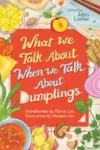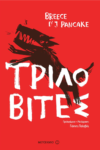
Jason Bell’s work has recently appeared in Guernica, Vice, The Brooklyn Quarterly, and Alimentum. He writes a monthly column for Full Stop about food and culture and lives in New Haven, CT, and St. Louis, MO.
I have an uncomfortable enthusiasm for General Mills breakfast cereal bars.
Specifically, the type made out of Honey Nut Cheerios or Cinnamon Toast Crunch, which are compressed into a block and then piped full of “milk” (the creamy stuff that makes an Oreo more than a dry chocolate biscuit). My enthusiasm for breakfast cereal bars is mostly about how delicious they are, in the same way that a very cold beer or barbecued rib can cause a body-shaking wake of pleasure that ends in relief. The kind of satisfaction that lasts an hour and then fades into a vague memory of how it felt to be satisfied, before sharpening into a hunger for whatever’s missing.
But my enthusiasm is also about the fact that breakfast cereal bars do not resemble anything inside of nature, but instead exist entirely outside of the plant and animal kingdoms. They represent the miraculous entrance of the imagination into the real world. As if I could imagine a sound stranger and richer than birdsong or the tinkling fizz of champagne and bring it into existence. But the breakfast cereal bar does not come from any one imagination, rather from a corporate brain composed of many professional, scientific, and bureaucratic imaginations seeking an object so incredible, so pleasing and yet inscrutable, that it inspires an enthusiasm that might in a small subset of the population reach manic proportions. Being a member of that manic subset, I cannot help but make myself uncomfortable in the presence of a six-pack of cereal bars.
At the risk of leaving this essay incomplete, I’ll spare you the details of how I feel, physiologically, after gobbling a box of breakfast cereal bars. The experience of being uncomfortable has a psychic component, one beyond the low-grade shame and regret that eating an entire box of breakfast cereal bars, however ontologically intriguing, might occasion. I am left wondering, as I examine, appraise, and swallow down a bar like a whole hardboiled egg, that my enthusiasm for this product — along with my enthusiasm for all processed and unnatural foods, including Hebrew National Hot Dogs, Kraft Macaroni and Cheese, Velveeta, Cheez Whiz, Pop Tarts, and Kool Aid — rests on the same basic pretension that seems to characterize most foodie enthusiasms these days.
For example, if I had an enthusiasm for heirloom tomatoes, artisanal honey, home-blended bitters, or small batch pumpkin seed brittle, I would look like an asshole. None of those products, however, can be the subject of an uncomfortable enthusiasm. They are all comfortable in their dependence on one’s involvement with the bigger picture comfort that accompanies a certain class status. Similarly, I would distinguish between the “basic bitch,” who a colleague recently defined over dinner in a crunchy veg resto as “high economic capital, low cultural capital, in a Bourdieuian sense,” with the uncomfortable enthusiast, who is self-conscious and unhappy about his or her basicness. A new Prius is comfortable, maybe; my 2001 beater is not. The problem is that somewhere along the axis of preference and enthusiasm there is a state of ironic appreciation.
What if I affected a knowledge of every Kool Aid or Pop Tart flavor in order to establish a distance between myself and people “too ignorant to know better” and who eat “junk” both because they unironically like junk and because they can’t afford organic toaster poppers or don’t have the time to make a short pastry and confit quinces and make homemade quince pastry strudel pockets? The anxiety of pretension, and the fact that I don’t seem like the kind of person who can express a serious intellectual and aesthetic interest in Pop Tarts, gives the whole situation a weird vibe and makes me uncomfortable, even while I am enthusiastic. (My portrait, which accompanies this essay, reflects this problem well — I feel compelled to write that it bears little resemblance to me, except for its perfect rendering of the mania that shapes my relationship with much of the artificial world. I am a lunatic, at least when it comes to the smell of laundry detergent, synth pop, and breakfast cereal bars.)
One cannot have an uncomfortable enthusiasm for luxury goods. One cannot have an uncomfortable enthusiasm for Bach, caviar, or anything that contributes to an upper-middle class, privileged, or otherwise bourgeois cultural perspective. Instead, uncomfortable enthusiasms always form around kitsch or refuse understood as such by the cultural elite who define themselves against it. One can have an uncomfortable enthusiasm for boxed wine or 80s country music in a way that is impossible for Pinot or Corb Lund. Although this distinction sets up an uncomfortably classed figure, one who knows what’s up with the cultural elite but disavows them, it seems to me that there are many uncomfortable folks wandering around drinking Franzia and listening to Conway Twitty because they really like that stuff better than whatever they think other people think they ought to like.
Take the movie Sideways (2004), which expresses the divide between comfortable and uncomfortable enthusiasm better than any other I can think of off the top of my head. Miles is a 40-some-odd wannabe writer who goes on a weeklong bachelor blast with Jack, his about-to-be-married actor buddy, to the Santa Barbara wine country. Miles is an insufferable wine snob who says crap like “there’s just like the faintest soupçon of like asparagus and just a flutter of a, like a, nutty Edam cheese.” A caveat: Miles is insufferable to me because I don’t know much about wine and so he threatens my perception of myself as a generally cultured and therefore meaningful person. I’m sure if I knew anything about wine, or if Sideways was called Seminar and was about a liberal arts education and people who sit around saying asinine things about Moby-Dick, I’d laugh and nod and say, right, look at how silly but worthwhile all of this crap is.
As the movie winds its way towards Jack’s wedding and spirals deeper into Miles’s (really touching) self-loathing (the scene where Miles looks in a mirror and says, “You’re such a fucking loser. You make me fucking sick,” must rank as one of the truest reflections of 21st century liberal arts educated masculinity I’ve seen), we realize that Miles is an alcoholic. What seems to me a comfortable enthusiasm — self-satisfied, precise, and in the form of connoisseurship — is actually out-of-control, embarrassing, and completely independent of the sensual properties of the substance in question besides its intoxicating power. (Cf. Miles swigging from the spit bucket when he can’t get a full pour of wine at a tasting event, or drinking his prized 1961 Cheval Blanc out of a takeaway cup at a skeezy burger restaurant after he blows it with love-interest Maya, which one could read as overflowing with symbolism or as a shallow alcoholic bottom.) Wine is ultimately nothing more than alcohol for Miles, which is only a way to numb the pain of being himself.
Enthusiasm and self-harm dwell in dangerous proximity. Uncomfortable enthusiasm marks the point where being “into” something begins to substitute for being out of touch with how other people understand the world to work, aka reality. That warning in place, I think it is possible to cultivate enthusiasm in order to experience culture in fresh, exciting ways. Most uncomfortable enthusiasms start out as an ethical act — to learn thoroughly about an object that a cultural elite has dismissed as unimportant or irrelevant. But we all must recognize the limit at which we lose a sense of discretion, the boundary between abnormality and pathology. Lately, I have been making my way through LFO’s discography. I have set aside the breakfast cereal bars, because they seem to trigger a feeling beyond the uncomfortable, a lawless moment inside my sincere para-connoisseurship. I can only expect that eventually, so will “Summer Girls.” Until then, I am enjoying a fleeting sense of satisfaction — in Abercrombie and Fitch, Billy Shakespeare, and Alex P. Keaton.
This post may contain affiliate links.







